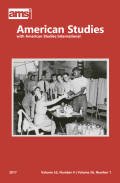Resumen
Contemporary U.S. white migrants working in Japan long-term as English teachers find themselves in an increasingly precarious labor market. When reacting to industry flexibilization, the U.S. men I interviewed during two years of fieldwork in Nagoya regularly invoked Filipina competition as an impending threat to their livelihoods. Anxieties coalesced around the question of whether racialized postcolonial subjects can fully inhabit the category of "native English teacher." This essay combines Asian American, postcolonial, and transnational American Studies perspectives to situate these "nativist" logics within an historical trajectory of anti-Asian labor backlash in the United States and "benevolent assimilation" policies in the Philippines. These histories reappear within Japan's neoliberal labor regimes to position Filipina migrants as a feminized "yellow peril" menace to hegemonic white masculinities abroad. Extending Homi Bhabha's theories, the essay demonstrates how Filipina "colonial mimicry" undermines the embodied, linguistic authority of white "native" English teachers and becomes a discursive conduit for the transplantation into Japan of the "white male victim" figure commonly seen in domestic U.S. culture wars.
All items © Mid-America American Studies Association
Authors: If you prefer to remove your text(s) from this database please contact the editor.

